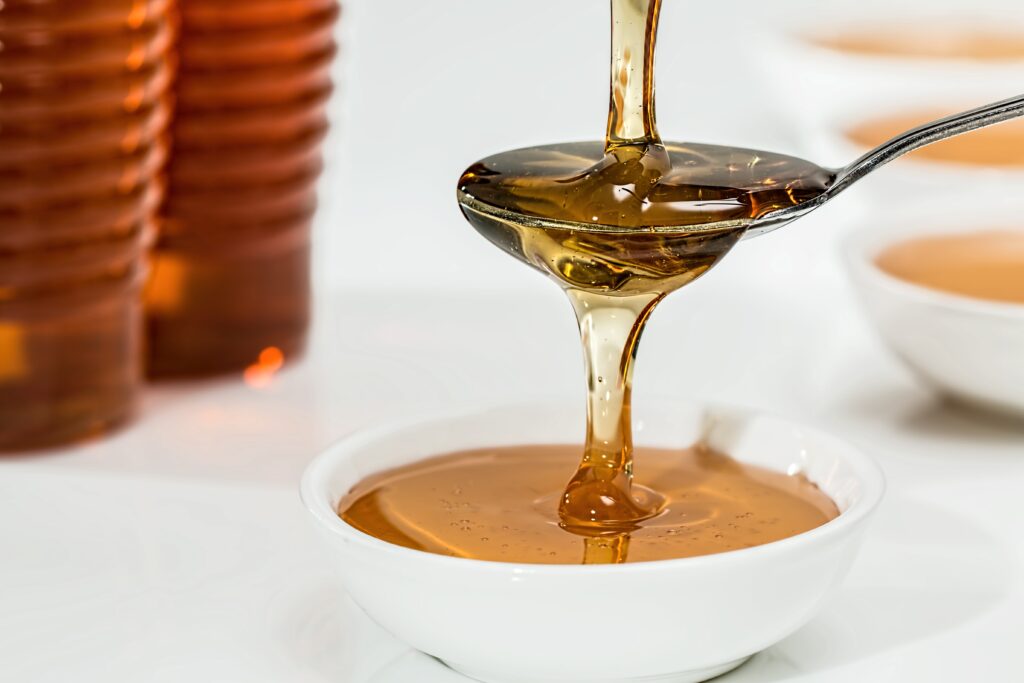
Overview
Manuka honey is far more than a sweet treat. This potent natural remedy, derived from the nectar of the Manuka bush (Leptospermum scoparium) native to New Zealand and parts of Australia, has earned a reputation for its powerful healing qualities. Unlike regular honey, Manuka honey contains a higher concentration of methylglyoxal (MGO), a compound responsible for its notable antibacterial properties. This guide delves into the history, scientific research, health benefits, and practical applications of Manuka honey, providing a thorough understanding of its therapeutic potential.
The Unique Origins of Manuka Honey
Manuka honey is sourced from New Zealand, where indigenous Māori people have long utilized the Manuka plant for its medicinal properties. The honey produced from the Manuka flowers is distinct due to its high levels of MGO, hydrogen peroxide, and dihydroxyacetone (DHA), which contribute to its exceptional antibacterial activity. Although all honey exhibits some natural antibacterial properties, Manuka honey’s potency is significantly higher, attributed to these compounds
Understanding the UMF and MGO Ratings
The quality and therapeutic potential of Manuka honey are often indicated by the UMF (Unique Manuka Factor) and MGO ratings:
- UMF Rating: The UMF rating reflects the honey’s potency and measures the concentration of signature compounds like MGO, DHA, and leptosperin. A UMF rating of 10+ is considered therapeutic, while anything above 15+ is classified as medical-grade.
- MGO Rating: This rating measures the concentration of methylglyoxal, the compound responsible for Manuka honey’s antibacterial properties. Higher MGO levels (400+ or more) indicate stronger antibacterial potency
Related : Honey Nature’s Sweet Medicine for Health
Nutritional of Manuka Honey
Manuka honey is a natural sweetener, but its nutrient profile goes beyond simple sugars. Here’s an overview of its nutritional components
- Calories: ~64 kcal per tablespoon (21g)
- Sugars: 16g (natural sugars, including fructose and glucose)
- Vitamins: Contains small amounts of B1 (thiamine), B2 (riboflavin), B3 (niacin), B5 (pantothenic acid), and B6 (pyridoxine)
- Minerals: Trace amounts of calcium, magnesium, potassium, iron, zinc, and phosphorus
- Amino Acids: Present in minimal quantities
- Antioxidants: Rich in phenolic acids and flavonoids
- UMF (Unique Manuka Factor): Measures the level of methylglyoxal (MGO) for antibacterial potency
Health Benefits of Manuka Honey
Manuka honey’s health benefits are not just folklore; scientific research has validated its role in promoting wound healing, supporting digestive health, boosting immunity, and improving skin conditions.
Wound Healing and Skin Health
Manuka honey has been widely recognized as an effective natural remedy for wound healing. Medical-grade Manuka honey is used in clinical settings for treating wounds, burns, and ulcers due to its antibacterial and anti-inflammatory properties.
- Burns and Cuts: The honey creates a moist environment that aids tissue regeneration and prevents infection, accelerating the healing process.
- Ulcers and Pressure Sores: Manuka honey has been shown to improve the healing of chronic wounds such as diabetic ulcers and bedsores by reducing bacterial load and promoting skin repair
Supporting Oral Health
Manuka honey can help maintain oral health by reducing harmful bacteria that contribute to gingivitis, tooth decay, and sore throats.
- Gum Disease: Its antibacterial properties make it useful for reducing plaque buildup and lowering the risk of gum disease.
- Sore Throats and Canker Sores: Gargling with a mixture of Manuka honey and warm water can soothe throat pain and inflammation, aiding recovery from minor oral infections
Improving Digestive Health
Manuka honey is known for its ability to balance gut bacteria and soothe digestive discomfort, making it helpful for conditions like acid reflux, gastritis, and irritable bowel syndrome (IBS).
- Managing Acid Reflux: It coats the stomach and esophagus lining, reducing irritation from stomach acid.
- Combating Helicobacter pylori Infections: Research suggests that Manuka honey may inhibit H. pylori, a bacterium linked to stomach ulcers, enhancing traditional treatment methods
The Health Benefits of Tomatoes
Boosting Immune System Function
The antibacterial and antioxidant properties of Manuka honey can enhance the immune system’s ability to fight off infections.
- Cold and Flu Prevention: Regular consumption may help reduce the frequency and severity of colds.
- Immune Modulation: Manuka honey stimulates the activity of white blood cells, aiding the body in defending against harmful pathogens
Soothing Skin Conditions
Manuka honey’s anti-inflammatory and moisturizing properties make it beneficial for treating various skin conditions.
- Eczema and Dermatitis: Its soothing effects help alleviate itching and redness associated with eczema.
- Acne Treatment: Manuka honey’s antibacterial action helps reduce acne-causing bacteria, calms inflammation, and speeds up the healing of blemishes.
How to Use Manuka Honey
Manuka honey can be incorporated into your routine in various ways to support health and well-being:
Topical Use for Skin Care
- Wound Care: Apply medical-grade Manuka honey directly to burns, cuts, or ulcers, and cover with a sterile bandage. Change the dressing daily.
- Acne Treatment: Use Manuka honey as a face mask, leaving it on for 15-20 minutes before rinsing with warm water
How Lemons and Limes Can Improve Your Health
Oral Use for Digestive and Immune Support
- Daily Supplement: Consume 1-2 teaspoons of Manuka honey daily, either on its own or mixed into tea, smoothies, or yogurt.
- Sore Throat Relief: Mix Manuka honey with warm water and lemon juice for a soothing drink
Incorporating It into Your Diet
- Natural Sweetener: Use Manuka honey in place of sugar in tea, coffee, or baking for a healthful touch.
- Smoothies and Shakes: Add a spoonful to smoothies for an antioxidant boost.
Choosing Quality Manuka Honey
When selecting Manuka honey, consider the following:
- UMF and MGO Ratings: Look for a UMF rating of 10+ or higher for therapeutic benefits.
- Certified Authenticity: Ensure the honey is certified by reputable organizations like the UMF Honey Association.
- Source: Choose honey sourced from New Zealand, where regulations ensure authenticity and quality.
The History and Cultural Significance
Manuka honey’s medicinal use dates back centuries, rooted in Māori culture. The Māori people traditionally used the Manuka plant to treat wounds and other ailments. Scientific recognition of Manuka honey’s properties emerged in the late 20th century, leading to extensive research and global demand
Scientific Evidence Supporting Manuka Honey
Numerous studies have demonstrated Manuka honey’s health benefits:
- Wound Healing: Research in the Journal of Clinical Pathology highlights its ability to promote wound healing by inhibiting bacterial growth.
- Digestive Health: The Journal of Medicinal Food published studies showing that Manuka honey can reduce gut inflammation and alleviate symptoms of IBS.
- Antibacterial Action: It has been found effective against bacteria like Staphylococcus aureus and Helicobacter pylori, making it a valuable natural antibiotic.
Potential Side Effects and Precautions
While generally safe, Manuka honey should be used cautiously in certain cases:
- Allergies: Individuals allergic to honey or bee products should avoid Manuka honey.
- Diabetics: Since it is a form of sugar, diabetics should monitor their intake.
- Infants: Avoid giving honey to children under one year old due to the risk of botulism
The Takeaway
Manuka honey stands out as a versatile and potent natural remedy. Its scientifically supported benefits for wound healing, oral health, digestive support, and immune function make it a valuable addition to natural medicine. When choosing Manuka honey, consider the UMF and MGO ratings to ensure you’re getting high-quality, effective honey.
Incorporate Manuka honey into your daily health regimen, whether as a dietary supplement, skincare treatment, or natural remedy for common ailments. The healing power of Manuka honey can enhance your well-being and support a natural approach to health
Frequently Asked Questions
- What is Manuka honey?
Manuka honey is a type of honey produced by bees that pollinate the Manuka tree (Leptospermum scoparium) native to New Zealand and Australia. It is renowned for its unique antibacterial properties. - What makes Manuka honey different from regular honey?
Unlike regular honey, Manuka honey contains high levels of methylglyoxal (MGO), which gives it strong antibacterial and healing properties. Its potency is measured by the Unique Manuka Factor (UMF) rating. - What is UMF, and why is it important?
UMF stands for Unique Manuka Factor, a grading system that indicates the quality and potency of Manuka honey’s antibacterial activity. Higher UMF ratings indicate higher levels of MGO and stronger medicinal benefits. - What are the health benefits of Manuka honey?
Manuka honey is known for its antibacterial, anti-inflammatory, and antioxidant properties. It is used for wound healing, soothing sore throats, improving digestion, and supporting the immune system











